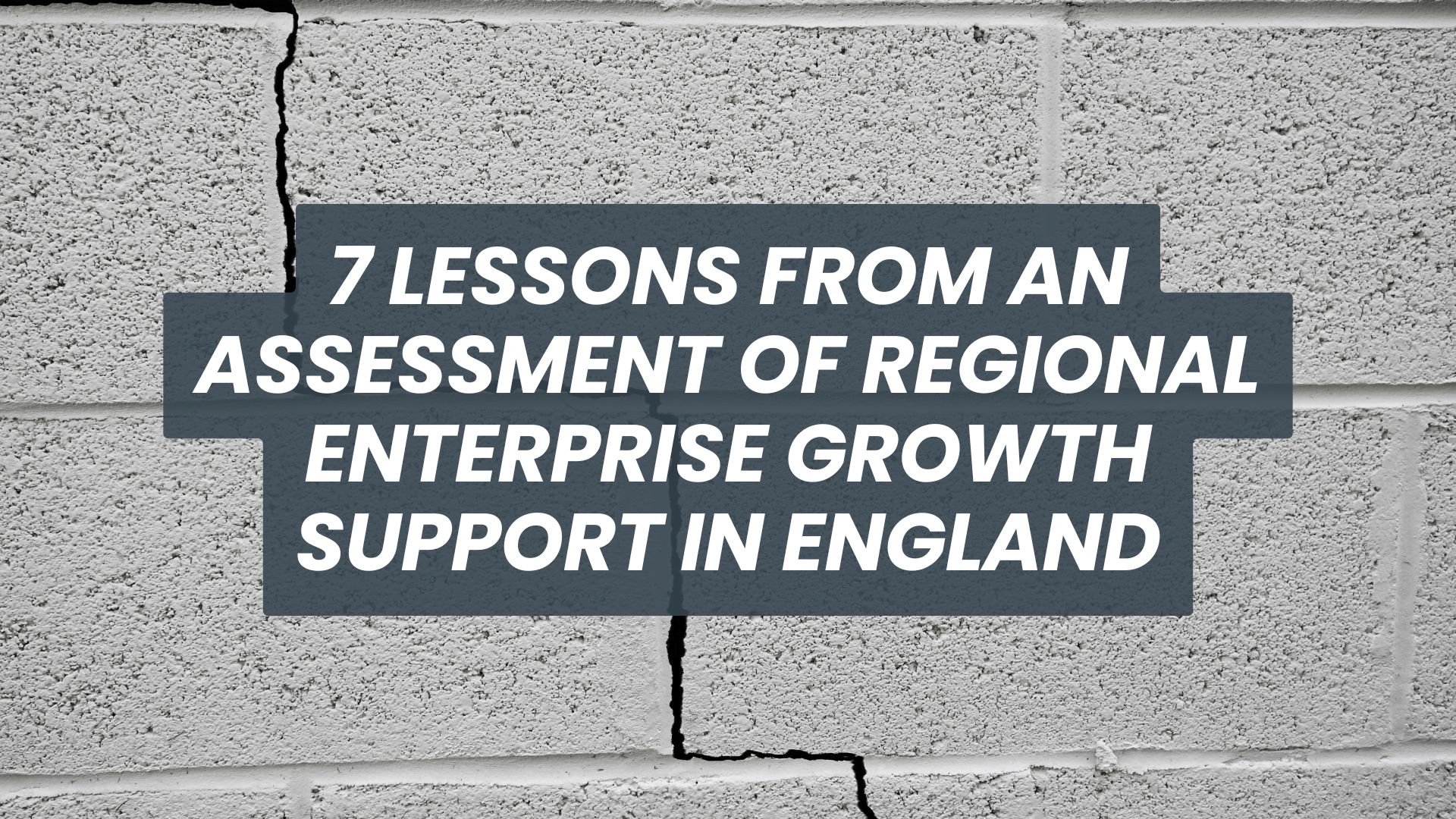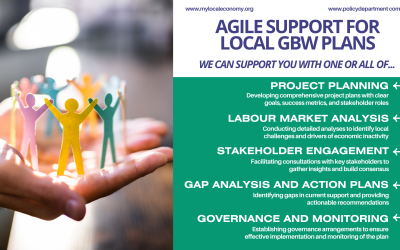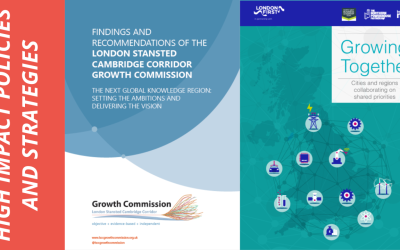A couple of years ago I helped a region review its approach to enterprise and business growth and inward investment promotion.
One of my key observations was that – this region is renowned for being a tech and business success, but in reality this success was in a small urban area accounting for less one-fifth of the population of the region. Outside of this successful small tech city, the region was characterised with a rural and land-based economy, with some manufacturing and logistics. The small city has a well known name and brand, and some amazing tech – but this didn’t translate far beyond the city boundaries. So we had to look behind the stereotypes and assumptions at the actual facts and dynamics taking place on the ground.
So lesson #1 was – don’t get drawn into stereotypes or myths
For one thing – this “growth region” had been underperforming for many years:
- Economic Growth: The area experienced below-average economic growth in the five years leading up to COVID-19 and ranked low compared to other regional and local authority areas.
- Productivity: Productivity (GVA per worker hour) was consistently below regional and national averages.
- Jobs Growth: Jobs growth significantly fell in the five years preceding the review, lagging behind regional and national averages, particularly driven by weak employment growth in the smallest businesses.
- Enterprise Activity: While the business population grew strongly overall, rates of business creation were below average, and short-term survival rates were below regional and national averages for much of the preceding five years.
- Inward Investment Growth: The growth in inward investment stock was much less than that seen across other regions and nationally.
Recommendation: Always review economic evidence and research, and do this regularly as economies and industries are dynamic and change. If the evidence contradicts commonly held views – these views are probably stereotypes, exaggerations or based on outdated information.
Lesson #2: Nowhere is sheltered from external headwinds and transition challenges:
- Businesses faced significant headwinds from the UK and global economies, including the cost of doing business/inflation, supply chain resilience issues, and continued labour shortages.
- Major transition challenges included Digitalisation, Productivity, and Net-Zero.
- Dependence on National Schemes and Lack of Local Competitive Edge:
- Local enterprise support was heavily dependent on national or “out-of-area” schemes.
This reliance made it difficult for the regional organisation responsible for economic development to gain a competitive edge over other places, as there was often a lack of additional local provision, or specialisation to address unique regional needs effectively.
Recommendation: stay abreast of changes in the economic and market environment. Regularly review the enterprise support offer vs. known challenges or needs.
Lesson #3 if you don’t regularly review and think about improvement and new challenges – misalignment and gaps in provision will emerge
There was scope to better align existing business support provision with the region’s strategic objectives and emerging needs, particularly around skills, decarbonisation, international trade, and tech adoption.
The existing enterprise support and growth offer, while filling some gaps (e.g., inward investment service, growth coaching, equity service), was perceived to have low brand awareness among stakeholders, even though it attracted new clients.
Another big difficulty was that this regional authority had externalised the Project Management Office (PMO) function – i.e. the team that monitors contract and service performance, enforces it, tracks changes in needs and challenges to re-specify and evolve services.
Therefore redundancy was built in. No-one was asking the hard questions of “is this portfolio of support still relevant in today’s economy and today’s business context?”
Recommendation: if local or national enterprise support schemes, regulatory regimes and policies are not regularly reviewed and updated, they can quickly become outmoded. National programmes may not align with local needs – and you can only influence this if you review evidence on local needs and challenge national policy makers and gatekeepers.
Lesson #4 feedback from contractors needs to be objectively assessed
There were challenges with programme delivery and impact measurement for some of the enterprise and inward investment support activities.
While client feedback was positive, and measured “additionality” was high, this was likely overstated due to the all the feedback being provided by contracted enterprise support service providers, and non-random sampling of surveyed companies.
Meeting overall job targets was challenging, with mixed performance across different workstreams (e.g., coaching, grants, equity, skills).
The lesson here is that you need objectively monitor and assess performance. Don’t rely on contractors to do this.
Recommendation: Performance monitoring should be independent from contractors. The PMO (Project Management Office) function is often a specialist role that is more effective under separate management or reporting lines to an operational department.
Lesson #5 Underperforming processes impact reputation and take-up
The application process for grants was described as long and frustrating, with complaints about the finance department and funds running out. This was despite the grants being quite flexible in terms of how they could be used.
The authority ran an equity fund. While making investments, the number of users was small, and there was no shortage of alternative equity funds for “investor-ready” businesses. The pace of equity investment was perceived as slow. We pointed out that at this scale, a separate equity programme was likely to have low additionality and would not be financially viable in the long-run as it did not have the scope for a big enough deal flow or co-investment with other equity sources. This was the conclusion from the English Regional Equity Funds established in the 2000s, and it was surprising that – a decade later, there was absolutely no awareness of this.
Recommendation: it is important to pilot and review grant application and award procedures. Drawing on experience, particularly from European Funds, can help to refine and streamline grant procedures. Having the marketing and communications reading, including for the closure of the grant fund, is advised.
Recommendation: Equity funds need scale and deal flow. It’s not going to be likely that they will be sustainable or practical at a local level. Instead focus locally on supporting enterprises with “finance readiness” so they can access the most suitable form of finance for the business.
Lesson #6 Best practice growth business support is tailored
Evaluations and research into growth businesses tell us that their characteristics and needs are varied, they are in different markets and at different stages, and cannot be catered for with a narrow offer.
This is why business growth accelerator models have been so successful – they operate programmes with significant flexibility and pull in expertise as required to help each single business.
Despite this – this authority was operating a growth business programme that offered access to a small number of counsellors and advisors, and a small grant fund. And with absolutely no integration into other sources of growth business support or accelerators, which could offer some superb support. The growth business service did not even share notes with a local growth business competition, despite the offer.
Recommendation: “Growth Business” support should be a gateway to a flexible range of support tailored to needs and what it takes to get the business on the next stage of its growth journey.
Lesson #7 Plant your flag and spell out what you are doing and why it is important – but make sure key stakeholders are part of this decision-making process
Like all public organisations, political change was added onto economic change (particularly during the Covid-19 pandemic). Changes to political control and executive leadership made it difficult to maintain consistent focus and direction.
The rationale and narrative behind the support programmes could have been more thorough. This would have helped to have clarified objectives and also helped to assess the market conditions and rationale at the time when the support framework was originated.
There was also a lack of involvement of key stakeholders and organisations in the development and delivery of enterprise and inward investment support. This meant that there wasn’t sufficient joint working or cooperation.
Recommendation: Use the established project and programme development processes and gateways (such as the Green Book process) to help to sharpen up the rationale and objectives of any economic development proposal. Involve key stakeholders early on – they can help improve proposals and plans as well collaborate and help refer businesses.
We specialise in asking the hard questions and scrutinising delivery – it’s the only way to improve
I work with a team of expert consultants. We are driven by the need to transform community prosperity, sustainability and inclusion.
We are experts at diagnosing performance, and fine tuning or redesigning economic programmes as needed, fit for today’s business and economic environment.
We work to high standards. If you want top class economic development programmes and performance – we’re here to help.







